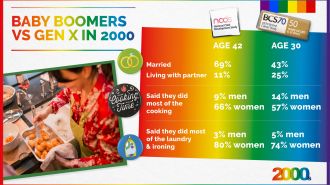
- Our studies
- Our research
- Publications and resources
- Data access and training
- About
- News
- Events
- Get in touch
- Join our mailing list

Welcome to our news and blogs section. Here you’ll find the latest developments and insights from across our longitudinal studies.
Young people from more deprived neighbourhoods have to wait up to 15 minutes longer for accident and emergency (A&E) treatment than their more advantaged peers with similar healthcare needs, according to new findings from Next Steps.

The BCS70 Age 30 Sweep was conducted in tandem with the Age 42 Sweep of the 1958 National Child Development Study.

Celebrating 50 years of the 1970 British Cohort Study – We’ve navigated through the 1990s, the decade when Cool Britannia was in full swing and BCS70 study members started to forge their own paths in the world. Here’s our animated tour of the decade.

Celebrating 50 years of the 1970 British Cohort Study – With five decades of invaluable service to British science and society, what has it been like for our 1970 British Cohort Study members to take part in the study? This week we speak to Liz.

CLS researchers, Professor Alice Sullivan, Professor Emla Fitzsimons and Dr Praveetha Patalay, are finalists for the ESRC’s Celebrating Impact Prize 2020.

Almost three quarters of British middle-aged adults spend more than eight hours sitting each day, new objective data taken from activity monitors has shown.

A new, searchable, online guide on physical activity measures used in six longitudinal studies, including the 1958, 1970 and Millennium birth cohorts, has been launched by CLOSER.

Celebrating 50 years of the 1970 British Cohort Study – The 1970 British Cohort Study highlighted how periods of being out of education, employment or training after leaving school can impact on young people’s lives

Celebrating 50 years of the 1970 British Cohort Study – The Age 26 Sweep was the first adult follow-up of BCS70, and over 9,000 cohort members took part.

Celebrating 50 years of the 1970 British Cohort Study – With five decades of invaluable service to British science and society, what has it been like for our 1970 British Cohort Study members to take part in the study? This week we speak to Gillian.

Celebrating 50 years of the 1970 British Cohort Study – BCS70 findings on adult numeracy and literacy helped to kickstart a series of government education initiatives that would improve the basic skills of millions of British adults during the 2000s.

Children growing up in families with expensive homes have fewer emotional and behavioural problems, finds new research led by the UCL Centre for Longitudinal Studies (CLS) based at the UCL Social Research Institute.

Next Steps is one of 11 new studies to join CLOSER in the first phase of its expansion.
Ryan Bradshaw
Senior Communications Officer
Phone: 020 7612 6516
Email: r.bradshaw@ucl.ac.uk